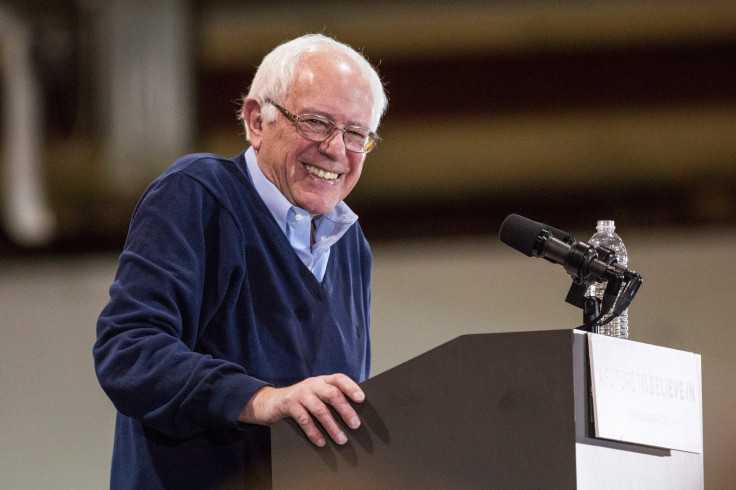Maine Democratic Caucus Results 2016: Live Updates Of Bernie Sanders, Hillary Clinton Faceoff

UPDATE 8:35 p.m. EST — According to vote-tracker Decision Desk, with 85 percent of the votes tallied, more than 46,000 people turned out to take part in the Maine Democratic caucus, which multiple outlets have projected as a landslide win for Vermont Sen. Bernie Sanders over former Secretary of State Hillary Clinton. A local reporter in Portland, Maine, tweeted before the results came in that the previous turnout record was 45,000 in 2008.
Chairman of @MaineDems tells me he wouldn't be surprised if more than 50,000 people caucused today. That would break 2008 record of 45,000.
— Grady Trimble (@Grady_Trimble) March 6, 2016
With 15% left to report, Democratic turnout stands at 46128
— Decision Desk HQ (@DecisionDeskHQ) March 7, 2016
UPDATE 8:23 p.m. EST — Vermont Sen. and presidential candidate Bernie Sanders reportedly won the Democratic Maine caucus in a landslide. According to NBC News, with 93 percent of the votes reporting Sanders took 64 percent of the vote, compared with 36 percent for former Secretary of State Hillary Clinton.
The Guardian registered a similar gap between the two candidates with nearly 80 percent in. A win in Maine would mark the eighth win for Sanders in the race to represent the Democratic party in the general presidential election.
Bernie Sanders adds an eighth state to his total in the 2016 race for president--Maine. https://t.co/IpQXm7EDyy pic.twitter.com/4g1i38xqiR
— AP Politics (@AP_Politics) March 7, 2016
And with 85% in from the ME DEM doc dump, Sanders wins the caucus in a landslide.
— Decision Desk HQ (@DecisionDeskHQ) March 7, 2016
UPDATE 8:10 p.m. EST — Just minutes after caucus sites closed in Maine, multiple news outlets projected that Vermont Sen. Bernie Sanders would win the state over former Secretary of State Hillary Clinton. Among the outlets that called the race for Sanders were NBC News and the Associated Press.
BREAKING: @NBCNews projects Bernie Sanders as the winner in the Maine Democratic caucus pic.twitter.com/oITkDUKMTi
— CNBC Now (@CNBCnow) March 7, 2016
.@AP calls Maine Democratic caucuses for Bernie Sanders
— USA TODAY 2016 (@usatoday2016) March 7, 2016
UPDATE 8:05 p.m. EST — The mayor of Portland, Maine, Ethan Strimling, tweeted an apology to voters who struggled to participate in the Democratic Maine caucus amid increased turnout. The leader of Maine's largest city said it would not happen again under his watch.
Yes. Apology needed and apology made. I am sorry for what happened today. Won't happen again on my watch. @maine_chirps @MaineDems
— Ethan Strimling (@mayorstrim) March 7, 2016
UPDATE 7:45 p.m. EST — Initial results for the Democratic caucus Sunday in Maine are close to being released. According to results tracker Decision Desk, the state is expected to release a first large chunk of data shortly after the last caucus sites are scheduled to close at 8 p.m. EST.
The last of the caucus sites close at 8pm ET. We expect the Party's first data dump sometime shortly thereafter.
— Decision Desk HQ (@DecisionDeskHQ) March 7, 2016
Decision Desk reported that raw tallies collected throughout the day, an imperfect measure, indicated that Vermont Sen. Bernie Sanders could hold a lead over former Secretary of State Hillary Clinton.
We have been collecting what little caucus returns we could thtoughout the day for Maine, raw tallies, not delegates awarded.
— Decision Desk HQ (@DecisionDeskHQ) March 6, 2016
With THOSE numbers, Sanders had a sizable lead. However, the state party will be releasing municipal results w/ delegates allocated.
— Decision Desk HQ (@DecisionDeskHQ) March 6, 2016
Original story:
Caucus sites were expected to close at 8 p.m. in Maine Sunday, following a day in which a perhaps record amount of Democratic voters came out to vote in a contest between former Secretary of State Hillary Clinton and Vermont Sen. Bernie Sanders. While anecdotal reports of results have apparently shown Sanders doing well, the official results were not expected to trickle in until later in the night, likely during the Democratic debate in Flint, Michigan, featuring the two candidates.
Up for grabs in the state are 30 delegates — 25 regular and 5 superdelegates — a relatively small amount. Going into the day Clinton held a 1,121-to-481 lead in delegates over Sanders, but much of the gap is because of superdelegates, who are able to change their allegiance. Polling in Maine has been infrequent, but some have suggested that Maine could go well for Sanders since the state is close to his home state of Vermont.
“This Democratic caucus, though, is likelier to confirm well-established trends than to predict future races. It’s the sort of state where Bernie Sanders has fared well — it holds a caucus, rewarding enthusiasm and organization; the state is 95 percent white; and it’s close to Sanders’s own state of Vermont,” wrote Yoni Appelbaum, a politics editor at the Atlantic.
RT @ChrisCostaTV: The line still wraps all the way around Deering HS @WCSH6 @WLBZ2 #MEDemCaucus pic.twitter.com/4TzRbBCkHJ
— WCSH 6 (@WCSH6) March 7, 2016
The story of the day in Maine has been a high turnout, which has caused headaches at caucus sites. To help ease the pressures of the turnout, the state's Democratic Party allowed for paper ballots to be filled out for those who did not want to wait to participate in a traditional town-hall-style caucus.
“It’s an extraordinary turnout. We are so excited that so many people want to participate in this process,” Maine Democratic Party chairman Phil Bartlett told the Portland Press Herald. “We are committed to making sure that any Democrat in line by 2 o’clock will have an opportunity to vote or cast their ballot in the caucus.”
The turnout was so extreme that one local lawmaker is reportedly set to submit a bill to change the state from caucuses to a primary system.
© Copyright IBTimes 2025. All rights reserved.






















